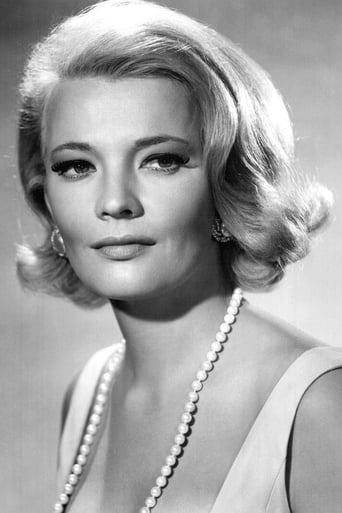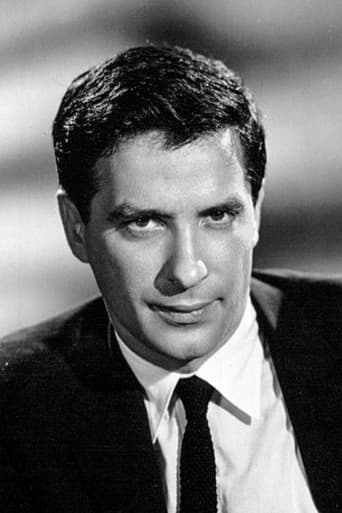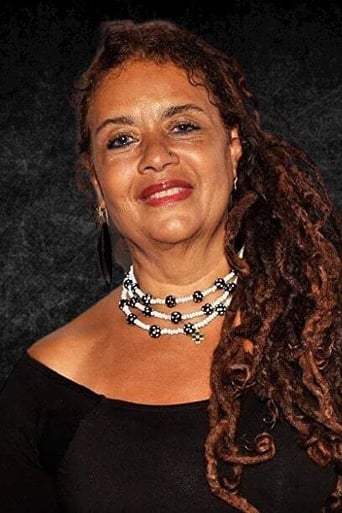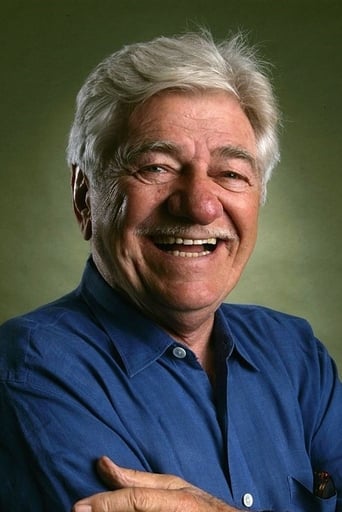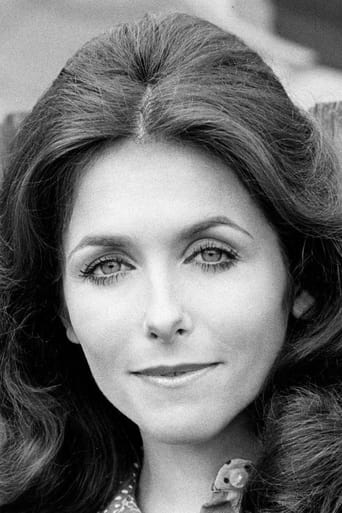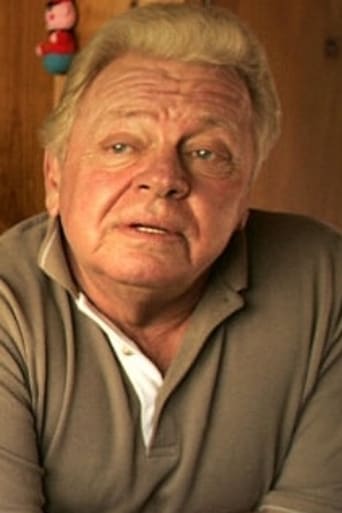treywillwest
Cassavetes's oeuvre has consistently been misinterpreted at "realist." In fact, his films are generally expressionistic- self-conscious presentations of his mind-set-as-such. Having said that his earlier films, which I must say sometimes upset me with what I found to be their misogynistic machismo, often struck me as trying to use artistic expression to make subjective masculinity seem like an objectivity- a fact to be taken into consideration. Jackson Pollock did this too, of course. The difference is that Pollock, in his work if not life, never presented the female as lesser in relation to male subjectivity. Cassavetes, sadly, did so often, but not, I will venture, in this work. In Love Streams the filmmaker's fantasies are his alone- he asks for no ratification from the audience. Yes: a character played by him is an awful date to a woman who then falls for the character. But I think we are not meant to identify with either the male or the female in this scenario so much as with ourselves as viewers. Cassavetes is putting his id on display here and asks simply for recognition of his subjectivity as such. Indeed, if there is a figure of identification for the viewer it is the character played by Gena Rowlands, the sister of the Cassavetes figure. Befuddled and disgusted by a world that does not acknowledge her romantic demands she is that which her brother, the artistic articulation of suffering and resolution, can only satisfy. He does so by taking the mantle of an Old Testament martyr, but one capable of laughing and crying at and for himself.
bandw
The story opens in the middle of a situation that, without context, makes for total confusion. We are introduced to Robert Harmon (John Cassavetes) and a gaggle of young women. Harmon is supposedly a writer who specializes in sexually-themed novels and is currently gathering data on urban night life. Odd that throughout the movie we never see Harmon writing. The first part of the movie is constructed from disconnected scenes. Sarah Lawson (Gena Rolands) is in a scene that is a divorce hearing trying to settle on parental rights. Sarah says she spends most of her time going to funerals and attending the sick. We never see her doing any of the things that she claims occupy her.The first half of the movie gets into understanding Robert and Sarah a little. The movie is half over before we know if there is any connection between Robert and Sarah. What was established in the first half was that Robert is a heavy drinker and a philandering ass. Sarah is seen as not playing with a full deck and at one point tells her ex-husband the she thinks she is almost not crazy. The movie takes a different turn when a woman shows up at Robert's door with an eight-year-old boy and tells him the boy is his son, and would he take care of him for a weekend. Just to indicate how far from how any real person would react, Robert's reaction to this appearance of his son, whom he has not seen since the kid's birth, is along the lines of "Sure, come on in." Some interest is developed in seeing how a wastrel like Robert reacts to having his son on board. He does boot out the young prostitutes from his house, but then encourages the kid to drink a beer and takes him to Las Vegas.After a trip to Europe where Sarah carries around a train car full of luggage, and has a stereotypical argument with a Frenchman who doesn't speak English, she returns to the U.S. and winds up at Robert's house where we finally learn that Robert and Sarah are siblings. Once Sarah and Robert are together the movie gradually abandons any attempt to stay on this side of reality and ultimately zooms off into the ozone. The signature scene that has Sarah bringing a menagerie of animals to Robert's house in a taxi (including a couple of horses, a goat, a duck, a parrot, and some chickens) struck me as just absurd. I suppose it was meant to be humorous, but it fell flat for me.Almost every scene struck me as lasting too long. What was to be gained by seeing Robert stagger drunkenly down a hotel hallway for about a minute? The aggregation of the overly long scenes makes for an overly long movie.There are some interesting scene compositions and lighting techniques and that is why I give this more than one star.This is my third Cassavetes movie and I think it will be my last. He is on a different wavelength from me.
ElMaruecan82
An emotional exploration into the true meaning of love, not the feeling itself but the very endurance of it, whether this feeling that fills your heart is canalized toward a person, an animal …or an addiction…Like many Cassavetes' movies, "Love Streams" provides more interrogations than answers, and while I couldn't determine what the director's intentions were, I thought the film's was the portrayal of two tormented hearts: Robert, a trashy alcoholic writer incapable to show affection and his sister Sarah, a divorced mother drown in her awkward obsessions for love and love be loved. Two polar opposites who'd learn lessons from each other in the movie-defining moment when Robert, witnessing the emotional downfall of his sister, grab her in his arms with a fierce tenderness, a moment of pure emotion beautifully conveyed by the film's poster.As usual with Cassavetes, characters are as unique and specific as their feelings. It's extraordinary how Cassavetes' films paradoxically embody the very aspect that differentiate between movies and reality: the absence of archetypes, no plot, no typical characters, all of his films are a tribute to the total independence of human's spirit from any attempt to translate them into plot devices, and "Love Streams" is the fitting masterpiece of the champion of independent film-making that concludes one of the most fascinating series of cinematic character studies that started with "Shadows", foreshadowing the coming of the American New Wave, and that reached its pinnacle with the unanimously applauded "A Woman Under the Influence". Indeed, it's only after having watched the other films that I became aware that "Love Streams" was the most beautiful statement to Cassavetes' work… the epitaph of an artist haunted by an imminent death.Sarah's torment mirrors the condition of Mabel from "A Woman Under the Influence", as a mother incapable of being herself because of her alienation by a total desire to be loved. On the other hand, Robert reflects the character of Cosmo in "The Killing of a Chinese Bookie" in his dedication to his occupation, his constant womanizing habits and the "Husbands" syndrome in the many contradictions that inhabits his mind and prevents him for being a good father. The presence of a child also reminds of the poor kids in "Influence" or "Gloria", and the total incapability to be educated or tutored by so-called adults as themselves happen to act with the same level of child-like cowardice by escaping from their responsibilities and picking the easy way. Indeed, Robert lets his kid have a beer or discover his lifestyle (including going to Vegas or hanging out with girls) while Sarah, in the most memorable scene, buys his brother animals so he can have 'a presence' to love. These unsettling moments highlight the insecurity of the protagonists their incapacity to control their emotions, yet their lucidity on their desires. Sometimes it worked like in the light-hearted "Minnie and Moskowitz", sometimes it didn't like in "Shadows", "Faces" and "Husbands". Satisfying, frustrating, embarrassing or even infuriating, the key in Cassavetes' characters is that they don't tell a story, but the slices of their lives echo the eternal duality of what we are and what we want to be, our social beings and emotional ones, and maybe the source of happiness is to reconcile one another, like in "Opening Night". I'm not trying to make random connections between "Love Streams" and other Cassavetes' films but to show how the Artist never changed and this film is probably the truest and most complete expression of all the eternal conflict between social pressure and emotions.And on that level, even the title, beyond its poetic resonance, perfectly describes the painful beauty of love. The word 'streams' refers to a movement, that follow either a linear or tortuous road, it kind of reminds of Fellini's strada: love as a road, a journey between hearts that are mostly chaotic in Cassavetes' film, streams being above any social labels. Being a parent is not loving like a parent and Cassavetes never take those labels for granted; love is too much an abstraction to be defined by a social status. In her desperate attempt to make her daughter and husband Seymour Cassel laugh, in a powerful improvised scene, Gena Rowlands shows more what it is to be a mother, than by claiming it in a meeting, and through his journey with his boy, in his tragic clumsiness, there is a part of inner truth in Robert's fatherhood, that the kid finally perceives when he shouts "you're my father".This is what love is about, it's action. And as most Cassavetes' film, "Love Streams" is guided only by actions, and the only genuine emotions that don't need actions to be proved are between Sarah and Robert, as they are so close they don't need to play a role together, the intimacy between them echoes the same intimacy between Cassavetes and his audience, who don't expect answers or entertainment, only the closeness to the truth of life. Yet the film feels more achieved, more mature on a technical level, like an allegory of Cassavetes' artistry, as if he tried to overcome a fascinating paradox that defined his genius: being an Artist, loved by average viewers, while making films that could only appeal to a certain category. Cassavetes was no elitist, yet his movies divided, he loved people, yet the reciprocity is more uncertain and maybe he tried to make a more 'normal' film so 'more' people would love him… but perfectly lucid that you can't do something just to please without becoming a patronizing impostor, and the reason we love his films is that he always remained true to his own nature, and desire of human authenticity.That's how real Artists are, and "Love Streams" is the best tribute to Cassavetes' genius.


